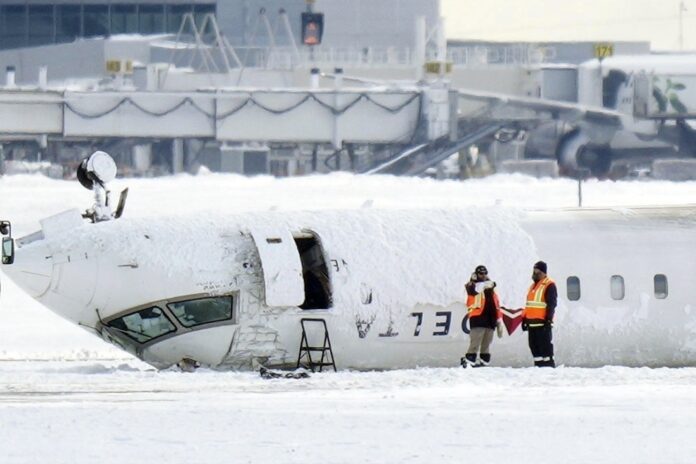In a shocking incident at Toronto Pearson Airport, Delta Airlines stepped in with a generous offer. The airline has promised $30,000 to each passenger. This comes after their plane flipped during an emergency landing. The airline confirmed the payout on Wednesday. They called it a way to help those affected by the terrifying crash-landing. The incident took place on Monday afternoon.
The CRJ-900 jet skidded along the runway. It then flipped upside down. Passengers and crew were shaken but ultimately unharmed. Delta’s offer is part of their ongoing efforts to help. They want to support those impacted by the unexpected and frightening ordeal. The large sum of money is meant to ease some of the trauma. There were 80 people onboard the flight.
$30K with no strings attached
Delta’s offer of $30,000 is a substantial amount of money, one that far surpasses what passengers of other similar incidents have received. For example, it’s six times the amount given to passengers involved in the famous Miracle on the Hudson flight. The airline has made it clear, however, that accepting the payout does not interfere with passengers’ rights. If passengers choose to accept the money, they are still free to take legal action against Delta, should they wish to pursue any claims related to the crash.
This means that the money is being offered purely as a gesture of goodwill, without any binding conditions attached. Delta’s decision to offer such a large sum is seen as a way to make amends for the traumatic experience, ensuring passengers feel supported even as the investigation into the cause of the crash continues.
What happened on flight 4819?
Flight 4819, a CRJ-900 jet, was on its way to Toronto Pearson Airport. Disaster struck during the flight. The plane skidded along the runway. It then flipped upside down. The incident was terrifying for everyone onboard. Despite the shocking crash, all 80 people survived. However, 21 individuals were hospitalized. They needed treatment for their injuries. The cause of the dramatic flip is still under investigation.
Authorities are working hard to figure out what happened. They are looking into the factors that led to the emergency landing. While the crash was frightening, it’s a miracle there were no fatalities. The incident has sparked widespread attention. People are amazed at the survival of everyone involved. Delta and the authorities are continuing to gather information. Meanwhile, passengers must cope with the emotional aftermath of the traumatic experience.

The airline’s statement
In a statement issued to The Post, Delta confirmed that the $30,000 payout would be offered to each of the 76 passengers who were on board the flight. The airline’s representative emphasized that the offer was being made with “no strings attached,” meaning passengers would not be required to forfeit any legal rights or claims in exchange for the compensation. This means that those who choose to accept the payout are still free to pursue legal action if they believe it is necessary.
The total payout could reach over $2.2 million, based on the number of passengers onboard. Delta’s gesture is part of its commitment to offering support during a difficult and frightening situation, and the airline has expressed its desire to help passengers as they recover from the ordeal.
Delta’s offer isn’t unique
Airline’s offer of a significant payout is not without precedent. Other airlines have made similar gestures in the past after accidents. In 2009, US Airways did something similar. They made an offer to passengers onboard Flight 1549. This flight made an emergency landing in the Hudson River after a bird strike. US Airways offered each passenger $5,000. This was to help compensate for the traumatic experience. They also reimbursed passengers for any lost luggage. Medical bills were covered for those who needed treatment.
The Miracle on the Hudson incident is famous. It involved pilot Chesley Sullenberger. The incident is widely regarded as a miracle. All 155 people aboard the flight survived. The airline’s quick response was praised. Their generous offer was seen as a way to help passengers cope. It was meant to ease the emotional impact of the event and its aftermath. In many ways, Delta’s offer is similar to US Airways’. Both airlines are seeking to support passengers who faced life-threatening situations.
What does this mean for passengers?
For the passengers aboard Flight 4819, the $30,000 offer may provide some financial relief as they begin to process the trauma of the crash. However, it’s important to note that this compensation is not a substitute for the emotional and psychological impact that such a harrowing experience can have. The passengers may still seek therapy, support, or legal action, and the offer does not prevent them from pursuing any claims they feel are necessary.
The $30,000 is simply a way for Delta to acknowledge the trauma passengers went through and provide immediate assistance. While the money may help cover medical bills or other expenses, it cannot undo the terrifying ordeal they experienced. For many, the memories of the crash and the moments of fear while trapped in the flipped plane will linger long after the money has been received.
In conclusion, Delta’s offer of $30,000 per passenger is a significant and generous gesture, designed to provide support after a terrifying crash-landing at Toronto Pearson Airport. The offer is made without strings attached, meaning passengers are free to pursue legal action if they feel it is necessary. While the money may help some passengers recover financially, the emotional toll of the experience will likely remain. However, the airline’s actions reflect a commitment to helping those affected by the incident, ensuring they are supported as they move forward from a frightening chapter in their lives.




